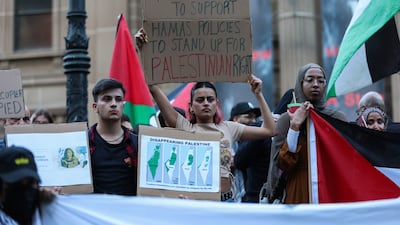“Unprecendented", “historic” or simply the “worst” violence perpetrated against Israelis in Israel. Whichever adjective you choose to describe the weekend’s attack on Israelis by Hamas militants, it has come at a time when public expressions of anti-Semitism were already on the rise.
Based on previous experience of Gaza-Israel conflicts, it was a reasonable expectation that this would occur again. And so far, that has been the case. In cities around the world, there have been outpourings of gleeful Jew-hatred among some groups of Hamas supporters. Most crudely, in Sydney, Australia, where crowds gathered by the iconic Opera House and chanted obscenities and called for the death of Jews. Organisers of the event later disowned those elements in the crowd who did this, but the chanting was an example of how easily the membrane-thin division between anti-Zionism and anti-Semitism can be torn.
In other demonstrations around the world, some of the behaviour was more akin to football fans whose team has won the World Cup: ecstatic with a bit of belligerent swagger. But this was not a football victory being celebrated or even a victory in a war rather it was the slaughter of Jews.
Anti-Semitism comes in many forms. It can be violent, or discriminatory, social and verbal. The last two in that list have been particularly on the rise in recent years. Verbal abuse in public and cyber spaces like X, formerly known as Twitter, have become an ugly fact of life for global Jewry.
The reasons why are varied. The ascension of hard-right, nationalist and populist politicians in traditional democracies is part of it. Politicians such as Hungary’s Viktor Orban relentlessly demonised George Soros, a Jewish financier, as an arch manipulator seeking to create a world government that supersedes national governments. Even former US president Donald Trump has not been above using anti-Semitic dog whistles about Jews’ loyalty to America to his followers.
This is also an age of conspiracy theories that flourish in social media. As Dr Matthew Sweet, a historian who writes frequently on the subject, pointed out to me in a podcast I hosted: “Conspiracy discourse gets around to the Rothschild’s control of the world fairly quickly.”
Georgia congresswoman Marjorie Taylor Greene spreads QAnon conspiracy theories regularly, including one that Muslim immigration to Europe is a Zionist plot, which will surprise many in Israel and Gaza.
Another reason for the more open verbal expressions of anti-Semitism is the passage of time. The Holocaust really did happen but it was 75 years ago. Holocaust denial is easier to spread the further in the past the event recedes. This was predicted by a Holocaust survivor I knew. After I covered the 50th anniversary commemoration of the liberation of Auschwitz, she contacted me. Her fear was that as survivors died out, no one would believe it happened. She may have been right.
But these factors need an accelerant to spread, and the conflict between Hamas and Israel provides it. In Britain, each round of fighting has provided a measurable uptick in public expressions of anti-Semitism, according to figures collected by Community Security Trust.
The effect on the Jewish diaspora of this growing trend of open anti-Semitism has been intense. Some of us try to use the safety our distance from the fighting gives us to try to help calm our own community and maintain the equilibrium of the cities where we live.
In London, this has borne fruit in the past few days. When Darna restaurant in the heavily Jewish neighbourhood of Golder’s Green was vandalised, Mayor Sadiq Khan went to visit and had a meal there to show his solidarity with the Jewish community.
Nevertheless, the Community Security Trust, which monitors anti-Semitism in the UK, noted anti-Semitic incidents in the UK are up by 324 per cent since Hamas attacked Israel, with more than half those incidents taking place in London.
But the immense scale of the violence perpetrated by Hamas and the anticipated retaliation has many in the Jewish world worried about a corresponding increase in anti-Semitism.
On Tuesday, when Israeli Maj Gen Itai Veruv visited the kibbutz Kfar Azza, the site of some of the worst atrocities this weekend, he told reporters: “It’s not a war or a battlefield; it’s a massacre.” Then he added, “It’s something I never saw in my life, something more like a pogrom from our grandparents’ time.”


